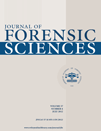Weakening Forensic Science in Spain: From Expert Evidence to Documentary Evidence*
Funded in part by the Spanish Ministry of Science and Innovation under Project TEC2009-14179 and Project DER2008-04639.
Abstract
Abstract: An amendment in 2002 to the Spanish Code of Criminal Procedure converted into documentary evidence the expert reports prepared by official laboratories aimed at determining the nature, weight, and purity of seized drugs. In most cases, experts are spared from appearance before the courts. This is likely to be extended to other forensic fields. After an overview of criminalistic identification in current forensic science, the objectivity and reliability concepts used by jurists and scientists are considered by comparing the paradigm of individualization with that of likelihood. Subsequently, a detailed critical study is made on the above-mentioned Spanish legal reform, and a comparison is made with the decision on the Melendez-Diaz v. Massachusetts case as ruled by the Supreme Court of the United States. Although the reform is in compliance with the Spanish Constitution, it is at odds with science, in particular regarding the logic underpinning the scientific evaluation of evidence.




